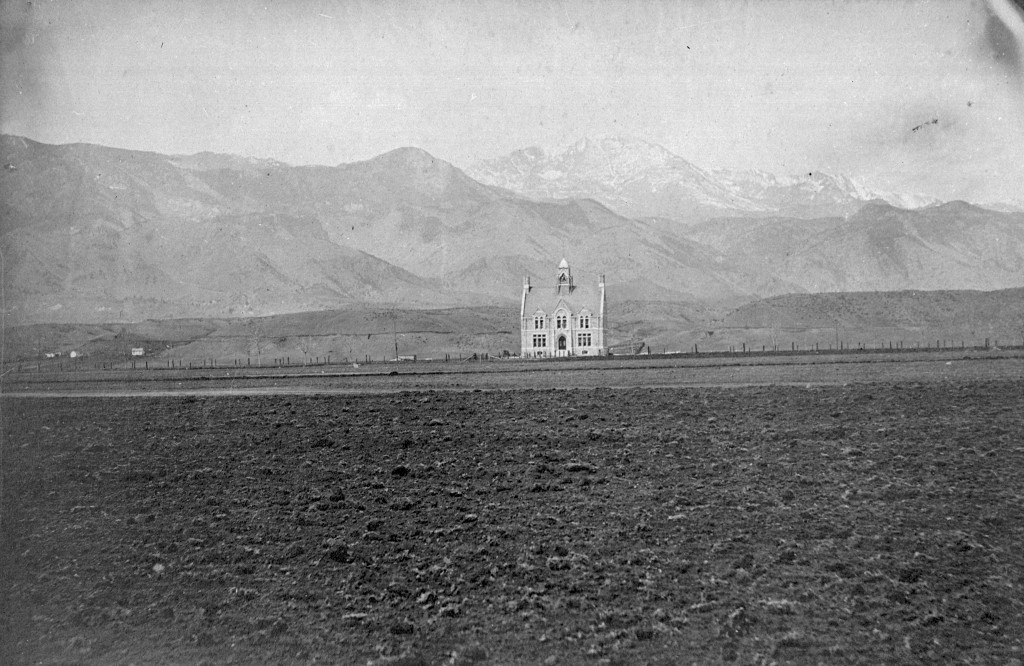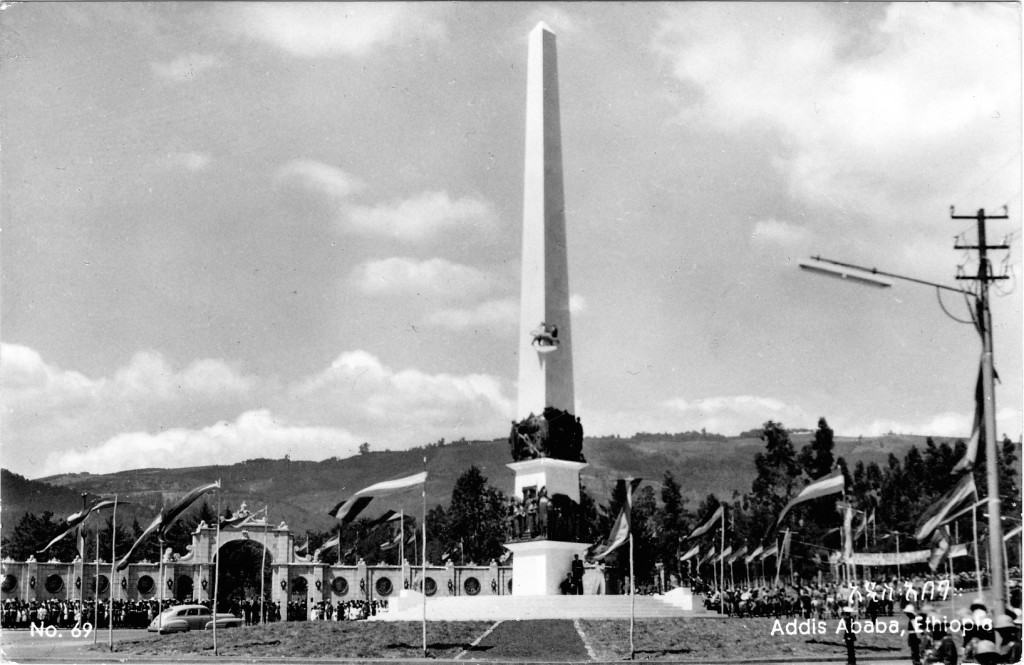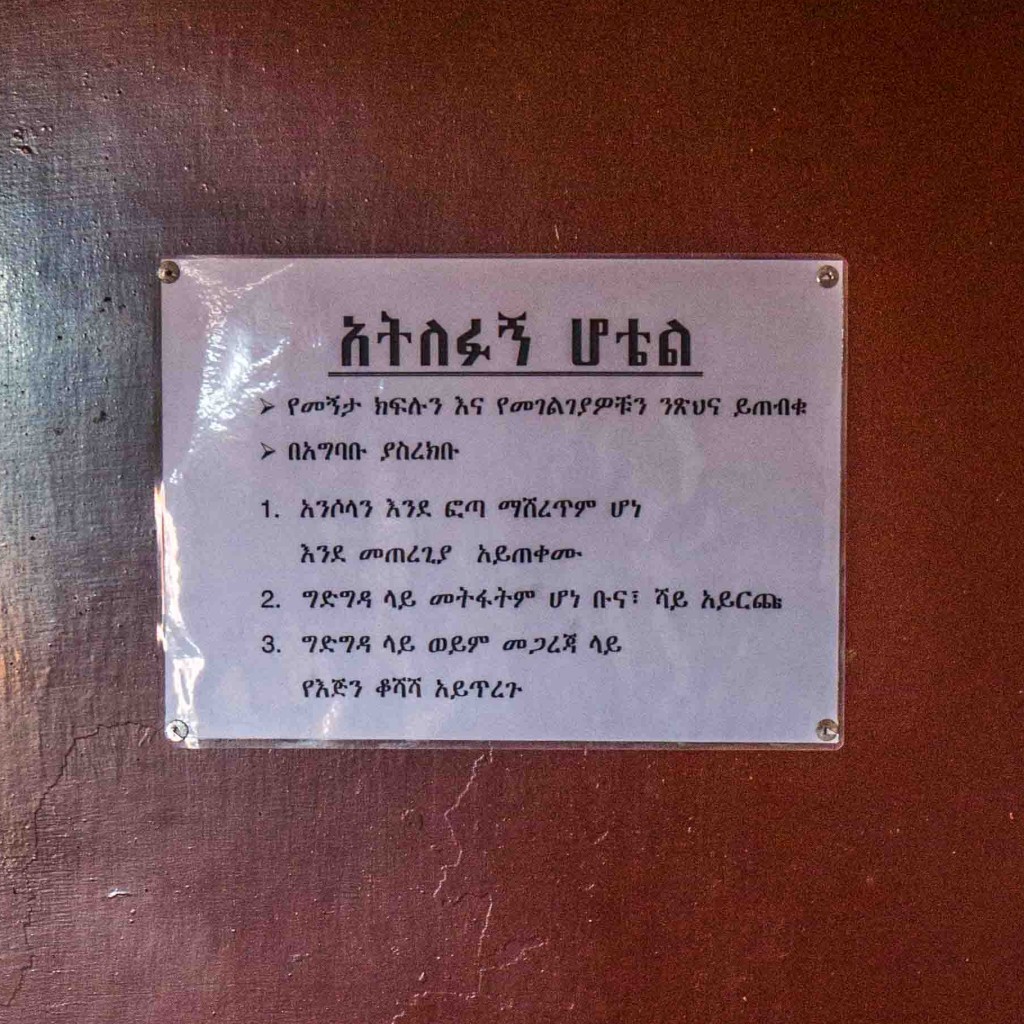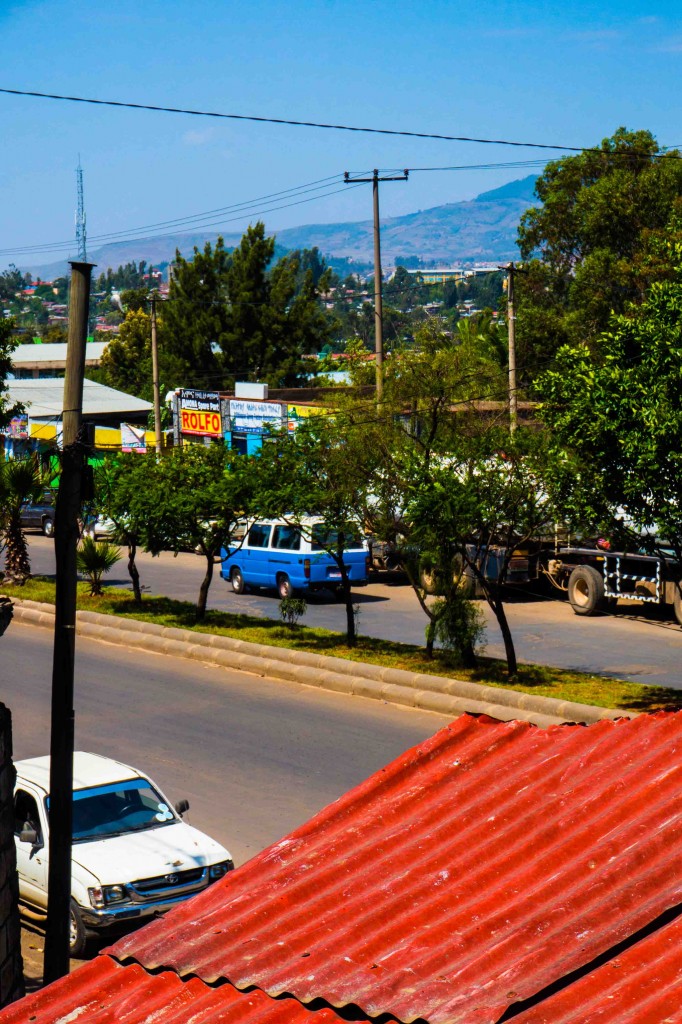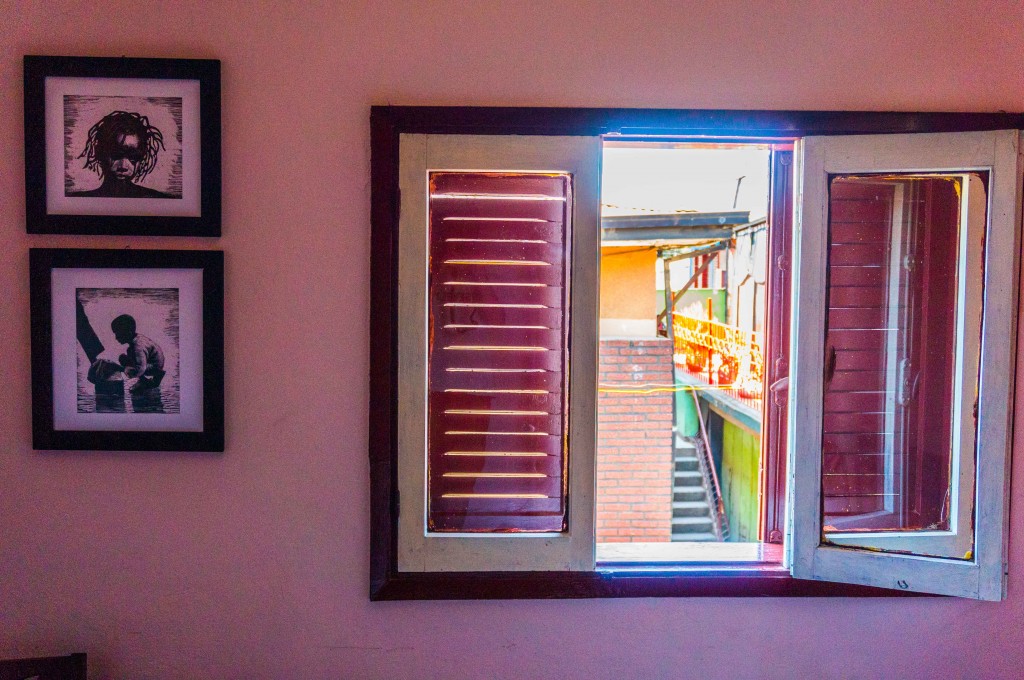Archive for category Ethiopia
History in the Streets
Posted by Phoenix McLaughlin in Ethiopia, Phoenix McLaughlin on June 10, 2014
This is what my college looked like when it was founded 140 years ago. I remember seeing this picture for the first time in that very building, Cutler Hall, and feeling a pang of historical awe. Now there are many buildings, not to mention grass and trees, that surround Cutler at Colorado College, and it is in the middle of the 600,000-person city of Colorado Springs. I can always remember the sensation of historical connection while looking at that picture. It gave me a glimpse of the story of the ground on which I stood. The places I have lived—Norway, Maine; Hampton, New Hampshire; and Colorado Springs, Colorado—tend to not be featured too strongly in the history books, so such insights into the places’ histories are rare.
Now I am walking the storied streets of Addis Ababa, Ethiopia, and I have been presented an opportunity for connecting to history on a level I had never imagined. The history of the city and the country is dramatic, and I found a source for discovering it in the book Cutting for Stone. It is a fantastic read. It is a semi-fictionalized autobiographical account of Addis in the mid-20th century, and it illuminates the period extremely well. The historical facts alone are interesting, but the book has brought them to life. It has made my walking around town feel much more significant.
Throughout the book and throughout Ethiopia, Haile Selassie is a monumental figure (although not always a positive one). He ruled Ethiopia for forty years and gave the country an air of stability and prestige that stood out to the world. It was because of this that Addis became a sort of capital for Africa—the African Union is based here, with the massive new headquarters visible from my hostel. Haile Selassie went beyond a mere political leader for some. A centerpiece of Rastafarian belief is that he was in fact the second coming of Jesus Christ—“an idea he didn’t mind his own people believing, but when it came from so far away and for reasons that he didn’t understand, made him wary.” He was traditionally believed to be a descendant of King Solomon and bore the appropriately modest title: His Imperial Majesty the King of Kings of Ethiopia, Conquering Lion of the Tribe of Judah, Elect of God. I am not used to walking on the same ground as people with those kinds of names. There are not many King of Kings in the U.S.
In the book, the main character sees the legendary Emperor Haile Selassie’s motorcade roll by one day—“The ground shook as the Ducatis slid past…His majesty’s green Rolls-Royce was polished to a mirrorlike finish. On a built-up seat, His Majesty looked out of windows specially constructed for monarchs to view and be viewed.” Yesterday, not long after reading this passage, I was treated to a motorcade experience of my own. The roads were closed off for miles all around; it took me 15 minutes of walking through streets emptied of cars before I finally came across the motorcade. A soldier halted me on the sidewalk to let some 25 cars, vans, and motorcycles scream by, each containing various men in suits. It would have been an interesting occasion regardless, but half expecting an emperor to roll by made it feel all the more important.
Alas, there was no emperor, since that title no longer exists in Ethiopia. Not much later in the book, a coup occurs, a fictionalized version of a real coup attempt in 1960. The book describes the clashing forces, the competition and eventual violence between the rebelling Imperial Bodyguard and the loyal Army, Air Force, and Police. Selassie was eventually deposed by another coup in 1974. With those images in mind, walking by the men in uniform sprinkled around the various armed forces headquarters in Addis gains new significance. The book has done the job of connecting them to their past, a tale of turmoil and conflict lasting into the 1990s.
One reason this history is so fascinating is that it is so recent. While my parents were pre-teens taking dance classes or playing ball in the yard, the man some considered to be the son of God was being overthrown by communists in the city in which I now live. Reading such a descriptive story set in Addis Ababa’s not-so-distant past has helped solidify a connection to that drama. I am only about halfway through Cutting for Stone, so I expect I will find some more history to revel in as I walk around Addis Ababa. It has already amplified my experience here to a great degree. Whether it be a college or a city, there is simply something extraordinary about tapping into the past of a place. I hope to do it more often.
Addis Ababa Helps Out
Posted by Phoenix McLaughlin in Ethiopia, Phoenix McLaughlin on June 4, 2014
I arrived in Addis Ababa last night. I have only been here for a little over 12 hours, but I have plenty of thoughts about the place already.
The main thing is that everybody has been extraordinarily helpful. This is good since I have needed a lot of help. When I first was leaving the airport, I needed a taxi to get to my hostel. The address given on the website was vague to say the least—it gave a neighborhood, but no street—and the woman I spoke with didn’t recognize the name. But without hesitation, she called the phone number listed on the page and asked where it was. It turns out she knew the place, she just didn’t recognize the spelling, so she got me a taxi and I was on my way.
When I arrived, the man in charge didn’t have my reservation. I showed him my printed confirmation, but he said he didn’t have it. Instead of turning me away, he had me take a seat in the restaurant while he figured it out. So I sat in the middle of a bunch of chattering Ethiopians and waited for him to return. I had little to do but stare at the TV, which was showing The Evil Dead for some reason, so I watched people be gruesomely murdered as I waited. The man (I still haven’t learned his name) returned periodically to let me know that his “guys” were trying to find me a room at another hotel. Sure enough, they found one, and he drove me over there, dropped me off, and gave me a key. He returned to pick me up in the morning and took me back to his hostel to give me a room. A shining example of customer service, he was.
I hope that the people I meet will continue to be as accommodating of my incompetence as those two were, because I know there is more to come. It is inevitable in a foreign country, especially a country as foreign as Ethiopia. I still need to find a phone, an apartment, and a good means of transportation, all of which offer plenty of opportunities to end up lost, confused, and in need of help. I’ve been served a quick reminder that independence only really works when you know how to do things. I don’t know how to do things here. Not yet, anyways. I expect it will be another week at least until I find some legs to stand on, and until then, I hope I don’t fall on too many locals.
I have been devising ideas on how to begin the actual research, and am keeping an eye out for any relevant information I come across, but it will be some time before I can really get into it. It would certainly be unwise to try and dive into it before becoming more grounded in this country, not to mention my partner doesn’t get here for another week. I look forward to truly starting to work though. My imaginings of how the project will come together have gotten a lot stronger since getting my first glimpse of this country. Hopefully it’ll start becoming reality soon.
In Transition
Posted by Katie Petitt in Ethiopia, Katie Petitt on May 29, 2014
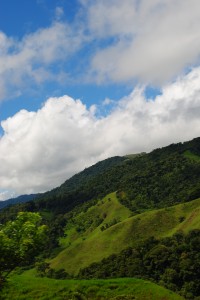
Monteverde, Costa Rica
I think I am one of the last Peacebuilder Fellows to arrive to their country, so I have a bit more time before I head off to Addis Ababa, Ethiopia. I am thankful for my extra time as I just graduated from my Masters Program in Costa Rica on Friday and need to wrap up my life here before my next exciting adventure. I am writing this first blog of many in Monteverde, Costa Rica as the sun sets over a beautiful jungle-mountain landscape; fitting way to spend one of my last nights here. I am here with my husband and my mom who flew down for my graduation. It is one of the last short trips I will take in this country I have called home for a year now. In a week and a half I will journey home to Texas to drop off some things and then make the long trip to Addis Ababa.
These transition days are always hard for me. I always try to live in the present and enjoy the people and things around me, but when big life changes happen like this my mind is already in the next place. I have spent every free moment doing the necessary tasks for the fellowship and looking up life and culture in Addis Ababa. I am excited about the connections I have made there already through my friends and through my now alma mater. Having people waiting to show you around and give you the lay of the land in a new city always puts me at ease and is always a fun thing. Some of these contacts I have been meeting work with water issues and more general environmental issues. I can’t wait to pick their brains and find out more about the water conflict Phoenix and I will be looking at. Water issues are so important in Ethiopia, as they are everywhere, and I am anticipating learning a lot this summer. I am especially looking forward to the conversations we will have with people. I think this fellowship is a unique experience in which we are encouraged to meet lots of people and hear stories of what is happening around this conflict.
I suppose my year at UPeace has been a type of preparation for the work I will be doing with Center for Conflict Studies and the Peacebuilders Fellowship. This year for me has been about Peace and Conflict studies, but within that I have learned the value of individuals who bring about peace in their own lives and in their community. Throughout this year I have been amazed at the capacity we humans have in being able to do great things, even (or maybe especially) in conflict zones. In my classes we heard story after story about individuals who despite their hardships and despite the violence around them, organized to make a change. My brilliant professor, Victoria Fontan, is on a mission to ‘decolonize’ peace. She spent the year telling the school, and especially my program (International Peace Studies- made up of 17 beautiful students from 14 very different countries), that this ‘decolonizing’ peace is about “making the invisible visible and transcending the universalism of liberal peace” http://www.amazon.com/Decolonizing-Peace-Victoria-C-Fontan/dp/1937570150 . So often we think that places experiencing conflict are filled with victims and perpetrators and these places need to be saved. This year has been about looking at the solutions that are coming from the ground and amplifying those solutions and those people, recognizing that there are complexities to solutions which means there can never be a cookie cutter answer.
After a year of learning all this I am so lucky to be working with an organization whose mission is to give a voice to the voiceless by telling the stories of people in a conflict. In Ethiopia, I will be listening to the voiceless and finding the invisible. I hope that in bringing their stories to you we can all become more aware of the specific conflict Phoenix and I will be looking at, but also more aware of those activists, teachers, religious workers, organizers, mothers and fathers out there who are tirelessly working for a better life, community and world.
I am honored to be apart of this first year in the fellowship’s history, and I am very much looking forward to what this adventure has in store for Phoenix and I in Ethiopia, as well as for rest of the teams spread out around the world. With a little over two weeks away, I haven’t experienced too much stress yet (I am sure it is coming). For now I am just trying to enjoy Costa Rica and life here, but I am also very excited about my time in Ethiopia. I am looking forward to learning more about water and the country’s history and culture, eating injera, and hearing lots and lots of stories!
Twitter: @KatiePetitt
After Colorado, Before Ethiopia
Posted by Phoenix McLaughlin in Ethiopia, Phoenix McLaughlin on May 28, 2014
Less than 24 hours ago I was sitting in traffic on a parkway in Connecticut. I was making my way through the highways of BoWash on the final leg of my journey from Colorado to New Hampshire following my graduation. On Monday, after a few days of driving around Maine and New Hampshire seeing old friends and family, I’ll be hopping on a plane to Frankfurt then Addis Ababa.
I spent most of college finding ways to travel to other countries, so it probably surprises nobody that I am flying out six days after finally returning home. The fact that it is unsurprising doesn’t make it less overwhelming, I admit.
There is a lot I still need to do to prepare that got lost in the throes of graduation, but I am not worried that it will be too much. At this point I mostly need to read a lot more about Ethiopia and nail down a place to stay for the long term. Unfortunately I have not found readily available books, movies, or websites that will tell me everything I need to know about the history of water conflict in Ethiopia, so some digging is required. The recent flare up between Egypt and Ethiopia over the Nile may offer a gateway to learning more about the overall water situation there, but we will still need a path to understanding the more personal impacts of water conflict.
Despite the work ahead and the recent flurry of life events, I cannot wait to get to Ethiopia and start figuring things out. I know of no better feeling than landing in a new country and being just grounded enough to not get lost, but still awash in unfamiliar new surroundings. So much can be learned that way. It is all the better that I will be traveling with a purpose to learn, not just for myself but for others back in the U.S. As a Peacebuilding fellow, I won’t be just a wandering traveller, but a researcher with a mission to discover stories of water conflict.
With that, I should be off to eat up everything I can find on Ethiopia. I know there is plenty left to discover.
